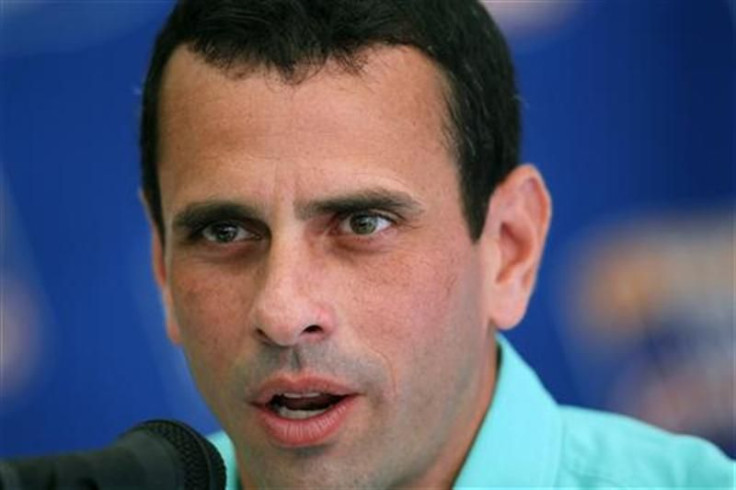Venezuela Presidential Election: Is Rise of Henrique Capriles a Warning Sign for Hugo Chávez?

Henrique Capriles Radonski, the Governor of Miranda state, has won the opposition nomination to fight the incumbent socialist President Hugo Chávez in the October presidential elections in Venezuela.
Capriles, 39, has swept the opposition primaries, defeating four of his opponents with huge margins. His one-sided victory in the primaries is seen as a warning sign to President Chavez who is looking forward to winning a third six-year term as Venezuelan President.
It is for the first time in Chavez's 13-year reign that Venezuelan opposition is gaining ground. The credit for this goes to the youthful energetic Capriles, who has captured the attention of the nation and mobilized a stagnant opposition from the grassroots level.
Capriles got 62 percent of the total votes in the primary, and more importantly, won the endorsement of his rivals immediately.
The challenge ahead for Capriles is to unseat Chavez, who is riding on the popularity of his welfare and socialist pro-poor programs. Chavez commands the support of the lower and middle class income segments in the society. According to opinion polls, Chavez's approval rates are still above 50 percent. He still holds the image as the savior of poor and downtrodden.
Chavez, realizing the challenge ahead this time, has revived and scaled-up his pro-poor missions in the highly populated but poor-urban areas. Chavez also has the support of the national media and administration, as an incumbent president. Furthermore, he already has an established election mechanism and organization.
On the other hand, the charisma which Capriles has brought in with his image as a go-getter has rekindled the hopes of the opposition, who so far believed Chavez was unbeatable. Capriles, who represents a rightist ideology, has played his game intelligently this time. He seems to know from where the support for Chavez emerges and how to block it. Though representing rightwing politics, he has promised the continuance of all the popular Chavez-era social and welfare programs in better and corruption-free manner, if elected.
Instead of blindly negating Chavez's policies, Capriles has strategically placed himself in contrast with the President. For instance, despite all his pro-development policies, Chavez is facing people's ire for the rising crimes in the country. People are highly concerned with the growing rate of homicides in the country. Throughout his campaign Capriles has targeted Chavez for the deteriorating crime situation in the country, but has never criticized his pro-poor welfare programs.
Another factor working for Capriles is the never-before-seen unity among the opposition cadres. Out of power for 13 years, the opposition has realized that its chances of defeating Chavez lie solely in unity. This has apparently motivated them to fall in line behind the chosen leader.
Capriles is also trying to leverage from the resentment that exists among the Venezuelans over Chavez's foreign policy-giving aids to socialist countries like Cuba. Many Venezuelans believe that the oil-money that can be used to further the country's development is being unnecessarily wasted abroad.
Capriles promises to end such indiscriminate foreign aid and use the funds for the betterment of the country.
So in a broader perspective, Capriles has promised all the good offerings of the Chavez government to continue if he is elected, while offering to right the mistakes of the ruling Government. This strategy may bring about the downfall of the Chavez government.
There are eight more months of campaign time left for both the candidates and the war in Venezuela is also closely watched in international circles. Socialist countries like Cuba and China for sure would want Chavez to continue, while U.S. and allies who are irked over Chavez's pro-communist/socialist foreign policy would prefer Capriles to win.
© Copyright IBTimes 2024. All rights reserved.












